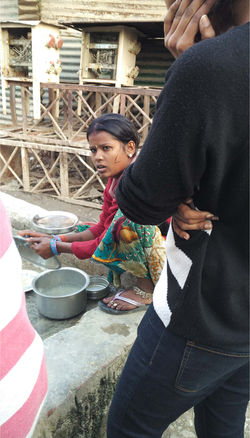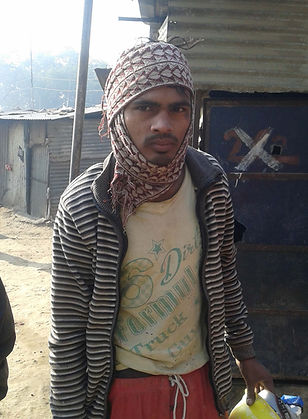 satender |  jai |  guddu kumar |
|---|---|---|
 zakir ahmed |  3 |  SIMBA SINGH |
Before studying the built, it was important to understand the stories of the very people inhabiting these spaces. Starting from what the situations back in their village was, we tried understanding their journey of how they ended up here and what their experience has been since they have started living here in these labour camps.

"पेट भरने के लिए कुछ तो करना पड़ता है"
"Salam walekum! My name is Zakir Ahmed. I am 44 Years old. I left my home town Dehradun 10 years back. There I had my own business of making and selling carpets. But these days, people hardly buy carpets so the business was in loss. Ab hume pet bharne ke liye kuch toh karna padta hai. So I migrated to Delhi in search of some work. Here, I knew a few people because of my carpet business. I was then introduced to a thekedar by one of my friends, and I started working with him. I was soon being recognised in the field and had many contacts of my own by now. This is my fifth construction site. I am now a satisfied person, though I still miss home. Even today, I wish to take forward my family's art of making carpets. Mai chahu, Mai chahu, dil se mai yeh chahu, apne bete ke banaye kaalin pe udkar Jannat chala jau."
- Zakir Ahmed
"जायेंगे हम भी एक दिन सऊदी"
"My friend from my village used to work as a construction worker in Delhi. After a while, he was transferred to Saudi Arabia when they needed some people for work. I have been inspired by him; I also want to go to Saudi. So I have been wandering around looking for work in construction, searching for an opportunity to go. I went to Mumbai and Bangalore before coming to Delhi a year ago. Jayenge hum bhi ek din Saudi."
- Satendra


"अपने सपनो को पीछे छोड़ कर..."
"I lost my father 6 months back. This was a turning point in my life. Even after being a graduate I have to work on construction site because I’m the only bread earner in the family. Humare halaat dekh kar mere mama ne mujhe Dilli bula liya aur kaam dilwa diya. Apne sapno ko peeche chhod kar main apni zimmedaariyan poori karne mein lag gaya. But with my ever-growing thirst to learn, I very soon became familiar with the work and quickly grasped many skills like reading technical drawings. I am good at my work and generally given the most skilful job at site like fixing window frames and glass panels."
- Guddu Kumar
We had a lot to learn from the people in the villages who had a lot of stories and instances to tell us. Talking to them we understood their lifestyles and were moved by their sense of togetherness and how we were welcomed with warm hearts.
"My husband and I used to be seasonal farmers in our village- Bhagalpur in bihar. For some extra income, we shifted to Delhi to find work. We wanted to earn enough money to send our children to school. We want them to be educated and make good lives for themselves, so that they have a better and more secure future than us. My husband still goes back to the village for up to ten days at a time during harvesting and sowing seasons. This way we are able to provide our children with a better life."
- Santosh devi


"घर है ना ठिकाना"
"When the green revolution happened in 1992 in North India, my friends and I migrated from Bihar to Punjab in search of some work. We worked there for a while as farmers. But that wasn’t a very reliable and steady source of income. So after a few years we started roaming around looking for work in construction. Since then we have been to most major cities in North India. We go to Punjab sometimes, because we have distant family there. But we don’t do farming there anymore since we don’t have any land. Bass ab ghar hai na thikana, jahan zindagi hume le jaye, hum chale jaate hain."
- Jai kumar Prakash
"बेटे के इलाज के लिए..."
"My son has cancer he is a small boy, only eight years old. When he was first diagnosed, he was four. The doctor in my village told me to take him to Delhi for treatment. That is why I came here for the first time. When I took him to the hospital, the doctors there said that I would have to bring him here regularly every two months or so. They suggested that I find work here itself. So I got myself a job at a construction site, so that I could stay close to the hospital whenever my son needs to go for his appointments. I have been in Delhi for 4 years now. I just pray to god every day that my son gets better and recovers his health."
- Simba Singh


"तीनो वक्त का खाना बनाता हूँ..."
Anil belongs to Murshidabad, West Bengal and has been living in a construction worker settlement since the past 4 months. His parents stay in the village and practise farming. He cooks three meals a day at the basti for 40 people along with 2 other helpers for which vegetables and grains are bought from the kotla market and paid by the thekedar. One of the workers comes at 10am to collect lunch for the workers at site. According to him water and electricity are available from 1pm to 2pm and 6pm to 12am.
-Anil
"पढाई के बाद भी नौकरी नहीं मिली"
Jai Kumar Prakash from Bekapur, Bihar, has been in the settlement since the past one and a half months. He works as a security guard from 8am to 8pm everyday. He has studied B. Com. from a government college in Bihar and used to work in an insurance company as a salesman earlier. He has been vacillating from job to job in New Delhi while his wife and three children live in the village.
-Jai Kumar Prakash

We had a lot to learn from the people in the villages who had a lot of stories and instances to tell us. Talking to them we understood their lifestyles and were moved by their sense of togetherness and how we were welcomed with warm hearts.
Punna Kewat Ji was a 70 year old man whom we met in the village. When he was young he had also migrated to various cities where he worked as a mason at construction sites. He has a son who also works as a construction labourer, is married and has 2 children. His life revolved around his family. He would play with his grandchildren and take them around for walks. He was one of the most friendly people in the village which influenced his daily activities. He spent most of his time walking around the village and interacting with other people who would also come to his house in the evening along with their own grandchildren.
-Punna Kewat

